Our Kingdom Stands Alone - How the Magyars Transformed Hungary into an Empire
- Thread starter Eber
- Start date
-
We have updated our Community Code of Conduct. Please read through the new rules for the forum that are an integral part of Paradox Interactive’s User Agreement.
You are using an out of date browser. It may not display this or other websites correctly.
You should upgrade or use an alternative browser.
You should upgrade or use an alternative browser.
I just noticed the coat of arms a while back was the hunyadi coat of arms!
Indeed.
Two countries in a personal union, with the monarch trying to use troops from one to impose his will on the other. All sounds very Charles I, English Civil War, etc to me. Will Matyas keep his head?
Two countries in a personal union, with the monarch trying to use troops from one to impose his will on the other. All sounds very Charles I, English Civil War, etc to me. Will Matyas keep his head?
Ah, very true. I hadn't even thought about that until you mentioned it. You're very right.
And for Matyas...well you just have to see for yourself.
I would still like Hunyadi on the throne, even if he's romanian...
Who doesn't love Romania?
I wanted to point out two things to everyone:
1) The next update shall be up by tomorrow at the latest. It is the second part of three that describe the Magyar Rebellion. The Rebellion lasted from 1422 - 1431, but it wasn't too exciting during much of those years. A lot of sieges, not too many notable battles. However, the very important events will be covered within the three updates. Once these updates are completed, Part 2 of the AAR will commence.
2) I finally bought Divine Wind because I had to wait for the Mac version. Well, this is awesome but it does pose a problem with my saved game. Since Divine Wind introduces new territories, the map looks a bit funny and the rivers and lakes are incognito to me. I failed to think that the saved game might not be very compatible with the new expansion. This is unfortunate because I had played up to 1609. Yet, what I am going to do is begin transporting my saved game into a new DW game. I am going to be heavily editing the start date of 1431 in DW. This will make it so that not only Hungary but all European nations (I will not bother with the Americas or Asia) will reflect that with my old save in 1431. Now, of course, this will keep territories identical, but things will have be different in other areas. Alliances, armies/navies, Badboy, and personal unions will probably be completely wiped out due to the restart in DW. I could potentially go in and make the new game identical, but I believe that it will not affect Hungary very much if Lorraine has a PU with Hannover.
I apologize for this slight inconvenience, but I believe that adding DW will add a bit of flavor to the AAR that it was lacking before. This addition will not affect my next two updates that will finish up the Magyar Rebellion, and hopefully by the time I finish Part 1, the transformation of my DW game will be complete. Just thought I would give everyone a heads up on what is going on with my game. Cheers.
Whatever you have to do to keep things moving smoothly -- I hope you enjoy DW! Latest beta or vanilla?
Chapter VIII – The Smell of Blood
The year of 1423 was nearly a disaster for Hunyadi and the Magyar rebels. King Matyas had completely destroyed two rebel armies and routed a third. The king’s daring campaign of 1423 was a devastating surprise for the rebels. The young king showed an incredible aptitude for war and knew how to exploit his enemy’s weakness. This weakness of the rebels, as Matyas understood, was the inability to consolidate its forces in time for a pitch battle. Matyas systematically searched out these smaller rebel armies before they could unite with Hunyadi’s main force. Of course, the campaign of 1423 was not solely due to the brilliance of King Matyas, but also the ineffective leadership and slow movement of the rebels. Branabus Hunyadi miscalculated on many occasions and underestimated the young king. This over-confidence cost the rebels about 10,000 men in one year – an amount that the rebels could not afford.
After the winter of 1423, King Matyas was intent on crushing Hunyadi once and for all. His army of 20,000 men was fully capable of destroying the rebel threat that was positioned only a couple miles away from them. Hunyadi had not retreated due to the overwhelming force in front of him, but instead used the winter to build fortifications in preparation of an assault. Matyas was perplexed with Hunyadi’s lack of movement. He believed that he commanded the superior force, and yet Hunyadi did not move – in fact, it seemed Hunyadi wanted a pitch battle. This, of course, made the king second-guess his intelligence on Hunyadi’s army. No man, he believed, would risk his entire army and possibly an end to the rebellion in a battle where they are clearly outnumbered.(1) Against his generals’ persistence in attacking, Matyas chose to hold his position – in case his enemy reports were inaccurate. However, he would not just sit idly by and wait for Hunyadi to make the first move. The king wanted to bridle any support that Hunyadi may receive in the coming months. In March 1424, Matyas left a small detachment of his army to hold his position as his main force was sent to quell any resistance in the surrounding lands. By the end of March, Carpathia was subdued. The army pressed on to Partium to effectively surround Hunyadi and trap him in Transylvania.
In April, unfortunate news was given to King Matyas as he waged his campaign in Partium. His infant son, Andras was gravely ill. The boy, with a slight chill, was wheezing and crying for the past three nights. His son received the best medical care available, but the royal physicians did not understand what had infected the infant.(2) Everyone, including Matyas could only wait and pray that his son would survive.
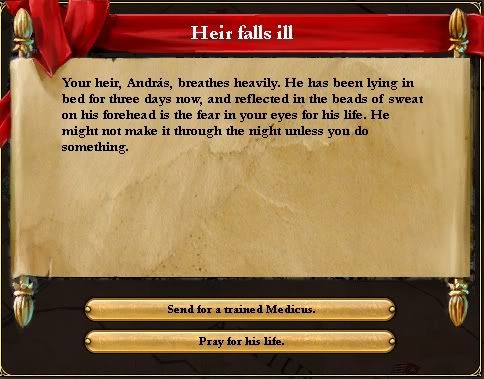
Only a few days later did Matyas receive word that his son passed away on April 18. His only heir was dead. He was young so hope for a new heir was still vibrant and expected, but his son’s death plagued the king’s mind for the rest of his campaign in 1424.(3)
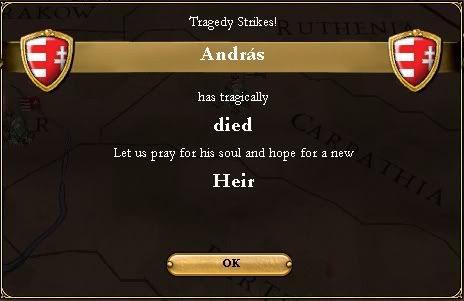
By November of 1424, rebellion activities in Partium were suppressed. During the past year, Hunyadi had not moved from his defensive position. He continued to collect word that Matyas was marching on rebel lands, destroying any resistance he found. Small towns that harbored rebels were utterly burned and destroyed – men were massacred, women were raped and children left parentless. King Matyas was showing no mercy toward rebel supporters. Magyar officers begged Hunyadi to wage a campaign to help the rebels, but Hunyadi knew that there was nothing the rebels could do. If the army moved from its defensive position, all hope for a victory would be lost. All the Magyar rebels could do was accept the inevitable, merciless actions of the king.
King Matyas’s campaign of 1425 would prove to be the fastest and most successful of all the years of the Magyar Rebellion. The Hungarian army would subdue and conquer Ersekujvar, Szolnok, and Osijek during the year. Matyas used terror tactics and allowed survivors of burned villages to spread the word that the king would not show mercy to any rebel supporters. Many of the villages that were affected by the Matyas’s army were not even in open rebellion against the king. However, that did not matter to Matyas or his loyal soldiers.(4)
In February of 1426, Matyas completed his task of subduing all rebel lands except that of Transylvania by eliminating any resistance in the region of Banat. By doing this, Matyas knew that Hunyadi would not have any more support from most of Hungary. The Voivode of Transylvania was now trapped in Transylvania with an army that had no hope of reinforcements. It seemed the days were numbered for Branabus Hunyadi and the remaining Magyar rebels.
However, on March 8, 1426, the Kingdom of Austria declared war on Hungary. The Habsburg King smelled blood with the Magyar Rebellion occupying King Matyas, and thought it could easily subjugate the Hungarian king and his nobles. Two Austrian armies would cross into Hungary by April of 1426. The larger army under the command of Kaspar von Roggendorf invaded Sopron with a strength of 14,500 men. The smaller army under the command of Ulrich von Frunsberg invaded Pressburg with 8,300 men. By the end of 1427, the Austrians would control Sopron and Pressburg. As per the plan, both Austrian armies would merge and attack Buda, Hungary’s capitol. During the Austrian sieges, King Matyas raised support to defend Buda and was able to field an army of 28,000 men.
On May 8, 1428, the combined armies of Austria would meet against the army of Hungary in the Battle of Buda. The battle, which would last for nearly eight hours, would completely decimate the Austrian army. Of the 23,000 men of the Austrian army, over 16,000 casualties were inflicted. The Hungarian army suffered only 7,000 casualties, as Matyas proved, once again, to be a capable general. His army proceeded to chase the Austrians all the way back to Wien, capturing nearly 4,000 more men in the Austrian retreat. The Kingdom of Austria would sue for peace in October of 1428. The Austrians would unfortunately realize that King Matyas was firmly in control of Hungary and could mount a successful defense of its country.
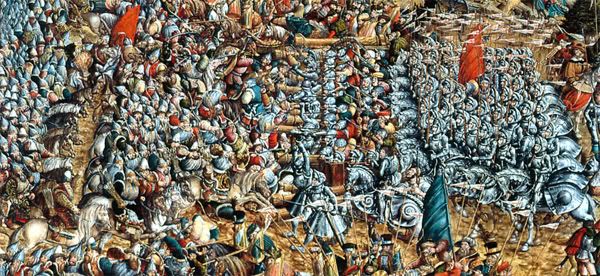
The Battle of Buda would save Hungary from the Austrian threat.
With the Austrian-Hungarian war ending, King Matyas swelled with pride and confidence. Believing that victory over the rebels were imminent, he marched to Transylvania to finally rid Hungary of the rebels. Yet, during the past two years with no army to subjugate its will, the Magyar rebels were busy. Hunyadi sent recruiters to Hungarian towns, as well as sending them to lands outside of Hungary, including Wallachia and Moldavia to try and gain soldiers. The Magyar rebels would be successful in their recruitment, as the army in Transylvania under Hunyadi would increase to 23,000 men. This time, as Matyas would fail to know in time, Hunyadi had the advantage and commanded the larger army.
The Battle of Transylvania would be a pivotal moment in Hungarian history. King Matyas commanding an army of 21,000 soldiers would recklessly attack the rebel army of Branabus Hunyadi on the fateful day of March 2, 1429. At first, the relatively coordinated attack went well for Matyas, as Hunyadi’s right flank wavered under the cavalry attack of Matyas’s Royal Guard, but reinforcements soon arrived that pushed the Royal Guard back. Hunyadi’s center soon began pressing Matyas’s center back, and before long the Hungarian center was broken. King Matyas seeing his men running from battle, tried desperately to rally his troops. With his bodyguard unit, he rode toward the center, calling his men to be brave. Unfortunately for Matyas, this would do no good, as his center was completely routed. With his center running, his flanks would give way. A full rout soon occurred, as loyal men under Matyas ran from the rebels. King Matyas, understanding defeat was clear, ordered an organized retreat, but to no avail. During the rout, the Magyar rebels, remembering what these soldiers had done to rebel supporters and even innocent Hungarians, showed no quarter. The rout became a massacre. In all, the Hungarian army would have over 9,000 casualties, with another 3,000 soldiers surrendering to the rebels. Hunyadi’s army would suffer only about 2,500 casualties.
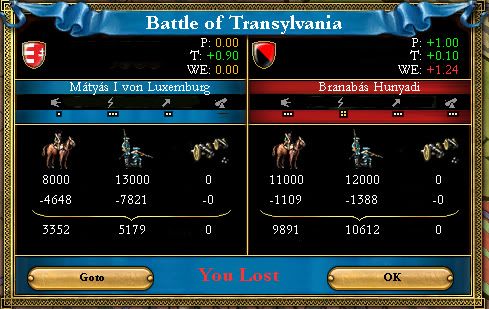
The Battle of Transylvania would be seen as a costly penalty for an arrogant, young king.
The battle was a devastating defeat for King Matyas and an overwhelming victory for Hunyadi and the Magyar rebels. A new life was breathed into the rebels, as the triumph in Transylvania could possibly turn the entire rebellion, for once, in favor of the Magyar rebels.
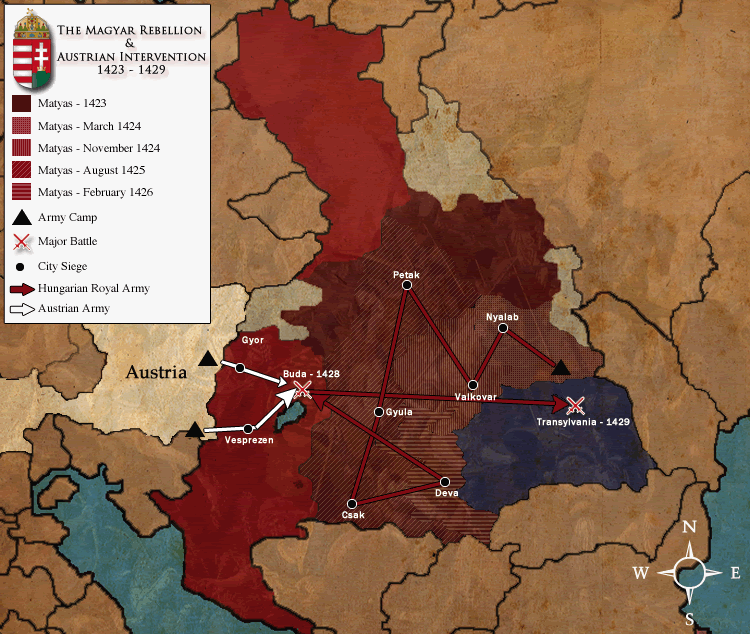
-------------------------------------
(1) - This was a fool-hardy miscalculation by King Matyas. For Branabus Hunyadi had shown before in his campaigns to fight battles with fewer men then his enemy -- such as he did against Poland in the defense of Buda.
(2) - It is still not known exactly what the infant Andras was infected with. It is probable that the young son died due to an unfortunate and relatively common virus that would overcome and kill many newborns during that time.
(3) - The death of his son would cause Matyas to take his anger out on the rebels and any supporters of the rebellion. It could be said that the death of Andras led to the deaths of hundreds of Hungarians during his campaigns.
(4) - Matyas's brutality against the Hungarian population would, at the time lead to a decline in rebel activity, yet it would eventually erupt in sizable support for the rebels. Many Hungarians who were neutral or even supporting the king would begin to support Hunyadi and the Magyar rebels because of the king's horrible treatment toward his own people.
The year of 1423 was nearly a disaster for Hunyadi and the Magyar rebels. King Matyas had completely destroyed two rebel armies and routed a third. The king’s daring campaign of 1423 was a devastating surprise for the rebels. The young king showed an incredible aptitude for war and knew how to exploit his enemy’s weakness. This weakness of the rebels, as Matyas understood, was the inability to consolidate its forces in time for a pitch battle. Matyas systematically searched out these smaller rebel armies before they could unite with Hunyadi’s main force. Of course, the campaign of 1423 was not solely due to the brilliance of King Matyas, but also the ineffective leadership and slow movement of the rebels. Branabus Hunyadi miscalculated on many occasions and underestimated the young king. This over-confidence cost the rebels about 10,000 men in one year – an amount that the rebels could not afford.
After the winter of 1423, King Matyas was intent on crushing Hunyadi once and for all. His army of 20,000 men was fully capable of destroying the rebel threat that was positioned only a couple miles away from them. Hunyadi had not retreated due to the overwhelming force in front of him, but instead used the winter to build fortifications in preparation of an assault. Matyas was perplexed with Hunyadi’s lack of movement. He believed that he commanded the superior force, and yet Hunyadi did not move – in fact, it seemed Hunyadi wanted a pitch battle. This, of course, made the king second-guess his intelligence on Hunyadi’s army. No man, he believed, would risk his entire army and possibly an end to the rebellion in a battle where they are clearly outnumbered.(1) Against his generals’ persistence in attacking, Matyas chose to hold his position – in case his enemy reports were inaccurate. However, he would not just sit idly by and wait for Hunyadi to make the first move. The king wanted to bridle any support that Hunyadi may receive in the coming months. In March 1424, Matyas left a small detachment of his army to hold his position as his main force was sent to quell any resistance in the surrounding lands. By the end of March, Carpathia was subdued. The army pressed on to Partium to effectively surround Hunyadi and trap him in Transylvania.
In April, unfortunate news was given to King Matyas as he waged his campaign in Partium. His infant son, Andras was gravely ill. The boy, with a slight chill, was wheezing and crying for the past three nights. His son received the best medical care available, but the royal physicians did not understand what had infected the infant.(2) Everyone, including Matyas could only wait and pray that his son would survive.

Only a few days later did Matyas receive word that his son passed away on April 18. His only heir was dead. He was young so hope for a new heir was still vibrant and expected, but his son’s death plagued the king’s mind for the rest of his campaign in 1424.(3)

By November of 1424, rebellion activities in Partium were suppressed. During the past year, Hunyadi had not moved from his defensive position. He continued to collect word that Matyas was marching on rebel lands, destroying any resistance he found. Small towns that harbored rebels were utterly burned and destroyed – men were massacred, women were raped and children left parentless. King Matyas was showing no mercy toward rebel supporters. Magyar officers begged Hunyadi to wage a campaign to help the rebels, but Hunyadi knew that there was nothing the rebels could do. If the army moved from its defensive position, all hope for a victory would be lost. All the Magyar rebels could do was accept the inevitable, merciless actions of the king.
King Matyas’s campaign of 1425 would prove to be the fastest and most successful of all the years of the Magyar Rebellion. The Hungarian army would subdue and conquer Ersekujvar, Szolnok, and Osijek during the year. Matyas used terror tactics and allowed survivors of burned villages to spread the word that the king would not show mercy to any rebel supporters. Many of the villages that were affected by the Matyas’s army were not even in open rebellion against the king. However, that did not matter to Matyas or his loyal soldiers.(4)
In February of 1426, Matyas completed his task of subduing all rebel lands except that of Transylvania by eliminating any resistance in the region of Banat. By doing this, Matyas knew that Hunyadi would not have any more support from most of Hungary. The Voivode of Transylvania was now trapped in Transylvania with an army that had no hope of reinforcements. It seemed the days were numbered for Branabus Hunyadi and the remaining Magyar rebels.
However, on March 8, 1426, the Kingdom of Austria declared war on Hungary. The Habsburg King smelled blood with the Magyar Rebellion occupying King Matyas, and thought it could easily subjugate the Hungarian king and his nobles. Two Austrian armies would cross into Hungary by April of 1426. The larger army under the command of Kaspar von Roggendorf invaded Sopron with a strength of 14,500 men. The smaller army under the command of Ulrich von Frunsberg invaded Pressburg with 8,300 men. By the end of 1427, the Austrians would control Sopron and Pressburg. As per the plan, both Austrian armies would merge and attack Buda, Hungary’s capitol. During the Austrian sieges, King Matyas raised support to defend Buda and was able to field an army of 28,000 men.
On May 8, 1428, the combined armies of Austria would meet against the army of Hungary in the Battle of Buda. The battle, which would last for nearly eight hours, would completely decimate the Austrian army. Of the 23,000 men of the Austrian army, over 16,000 casualties were inflicted. The Hungarian army suffered only 7,000 casualties, as Matyas proved, once again, to be a capable general. His army proceeded to chase the Austrians all the way back to Wien, capturing nearly 4,000 more men in the Austrian retreat. The Kingdom of Austria would sue for peace in October of 1428. The Austrians would unfortunately realize that King Matyas was firmly in control of Hungary and could mount a successful defense of its country.

The Battle of Buda would save Hungary from the Austrian threat.
With the Austrian-Hungarian war ending, King Matyas swelled with pride and confidence. Believing that victory over the rebels were imminent, he marched to Transylvania to finally rid Hungary of the rebels. Yet, during the past two years with no army to subjugate its will, the Magyar rebels were busy. Hunyadi sent recruiters to Hungarian towns, as well as sending them to lands outside of Hungary, including Wallachia and Moldavia to try and gain soldiers. The Magyar rebels would be successful in their recruitment, as the army in Transylvania under Hunyadi would increase to 23,000 men. This time, as Matyas would fail to know in time, Hunyadi had the advantage and commanded the larger army.
The Battle of Transylvania would be a pivotal moment in Hungarian history. King Matyas commanding an army of 21,000 soldiers would recklessly attack the rebel army of Branabus Hunyadi on the fateful day of March 2, 1429. At first, the relatively coordinated attack went well for Matyas, as Hunyadi’s right flank wavered under the cavalry attack of Matyas’s Royal Guard, but reinforcements soon arrived that pushed the Royal Guard back. Hunyadi’s center soon began pressing Matyas’s center back, and before long the Hungarian center was broken. King Matyas seeing his men running from battle, tried desperately to rally his troops. With his bodyguard unit, he rode toward the center, calling his men to be brave. Unfortunately for Matyas, this would do no good, as his center was completely routed. With his center running, his flanks would give way. A full rout soon occurred, as loyal men under Matyas ran from the rebels. King Matyas, understanding defeat was clear, ordered an organized retreat, but to no avail. During the rout, the Magyar rebels, remembering what these soldiers had done to rebel supporters and even innocent Hungarians, showed no quarter. The rout became a massacre. In all, the Hungarian army would have over 9,000 casualties, with another 3,000 soldiers surrendering to the rebels. Hunyadi’s army would suffer only about 2,500 casualties.

The Battle of Transylvania would be seen as a costly penalty for an arrogant, young king.
The battle was a devastating defeat for King Matyas and an overwhelming victory for Hunyadi and the Magyar rebels. A new life was breathed into the rebels, as the triumph in Transylvania could possibly turn the entire rebellion, for once, in favor of the Magyar rebels.

-------------------------------------
(1) - This was a fool-hardy miscalculation by King Matyas. For Branabus Hunyadi had shown before in his campaigns to fight battles with fewer men then his enemy -- such as he did against Poland in the defense of Buda.
(2) - It is still not known exactly what the infant Andras was infected with. It is probable that the young son died due to an unfortunate and relatively common virus that would overcome and kill many newborns during that time.
(3) - The death of his son would cause Matyas to take his anger out on the rebels and any supporters of the rebellion. It could be said that the death of Andras led to the deaths of hundreds of Hungarians during his campaigns.
(4) - Matyas's brutality against the Hungarian population would, at the time lead to a decline in rebel activity, yet it would eventually erupt in sizable support for the rebels. Many Hungarians who were neutral or even supporting the king would begin to support Hunyadi and the Magyar rebels because of the king's horrible treatment toward his own people.
I'm still with Matyas on this one. Although his treatment towards the civilian population was inexcusable, it's hardly exceptionable for a ruler of this period when faced with open rebellion. Hunyadi's strategy seems to have been:
Shading into 'Right but Repulsive' territory if you ask me.
- Do nothing
- Allow Austria to invade while remaining in revolt
- Gather a larger army and still do nothing
- Fight a defensive battle on picked terrain with larger army
Shading into 'Right but Repulsive' territory if you ask me.
Ooooo... Pretty map, I like it.
I have more respect for Matyas after his successful repulse of the Austrian invasion and containment of the rebels in Transylvania. He may not be any kinder that he was at the start of the rebellion, but he's demonstrated that he's not a talentless screwup whose main skill was to free ride on the achievements of a greater general.
Not sure where I stand on the Matyas-Hunyadi divide now, but I am dying to see which side finally triumphs.
I have more respect for Matyas after his successful repulse of the Austrian invasion and containment of the rebels in Transylvania. He may not be any kinder that he was at the start of the rebellion, but he's demonstrated that he's not a talentless screwup whose main skill was to free ride on the achievements of a greater general.
Not sure where I stand on the Matyas-Hunyadi divide now, but I am dying to see which side finally triumphs.
This has done it for Matyas. Hunyadi should win. I am against oppersion by Hungarians - Let the romanians do it for them 
You created more rebels?
Yes. Now, you may wonder why? I wanted my scenario to be realistic. As it was, I had a siege engineer as an advisor that gave me a 40% increase in siege defense. This made the rebel threat nearly neutralized because it took years for it to take a province. When the Austrians declared war on me, I was pissed because I was just about to finish off the rebels. It took 2 years to get Austria out of the war, but the Battle of Buda definitely was the turning point. I realized that during these two years, in which I did not interfere with the rebels, that was plenty of time for rebels to recruit more to their cause. With Austrians running amock in the west, the rebels were strengthening their hold in the east. Plus, as I was trying to relate, the brutality of Matyas and his army would cause many new recruits for the rebels (a little spin, of course.) Also, just to show I wasn't a complete masochist, I did get this event twice during the rebellion:
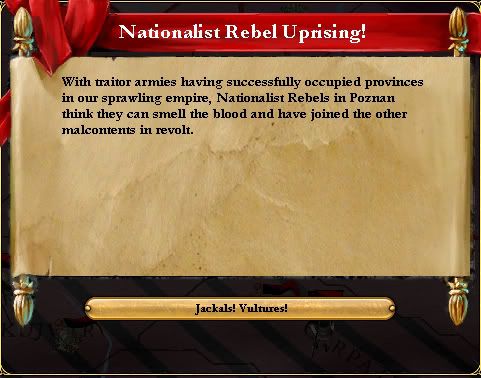
I chose not to speak about it, but I thought with those two revolts plus trying to make the rebellion more realistic, I didn't think it was too ridiculous (even if slightly harder) to add another 10,000 men to Hunyadi's army in Transylvania. What I did not plan on was losing the battle against Hunyadi, at least not as badly as I did.
Dewirix said:I'm still with Matyas on this one. Although his treatment towards the civilian population was inexcusable, it's hardly exceptionable for a ruler of this period when faced with open rebellion. Hunyadi's strategy seems to have been:
Do nothing
Allow Austria to invade while remaining in revolt
Gather a larger army and still do nothing
Fight a defensive battle on picked terrain with larger army
Shading into 'Right but Repulsive' territory if you ask me.
Well I do agree with you on a couple points. Matyas's mistreatment of the Hungarian population was definitely not out-of-context with other rulers of that day. When facing a large rebellion, you quell it by making sure the populace fear you. I also agree that Hunyadi was closely walking near the line of inactivity and less than honorable action, but you also must consider the situation. If you were Hunyadi, with only about 10,000 men facing an army that doubled your strength, what would you do? It would be fool-hardy to openly engage in a battle where the odds were completely against you. When Austria invaded, it was a perfect time to maybe strike at Matyas or lay down your arms and defend your country. Yet, Matyas had enough men to defend against Austria (plus, I did not mention that I was allied to Milan, which had grown to be relatively large and they honored the alliance -- so Austria had to deal with a two-front war.) At least, Hunyadi didn't attack Matyas while he was on his Austrian campaign, he was honorable and loved Hungary enough to make sure it was safe from foreign rule, even if it is having internal struggles. It takes a while to recruit enough men to double your army so I didn't think his inaction during the Austrian war was necessarily wrong. He fought a defensive battle, yes, but Matyas did provoke him before he could make a move -- in this case, it was definitely Matyas (well mine) mistake for attacking a fortified army that was slightly larger then mine.
Chris Taylor said:Ooooo... Pretty map, I like it.
I have more respect for Matyas after his successful repulse of the Austrian invasion and containment of the rebels in Transylvania. He may not be any kinder that he was at the start of the rebellion, but he's demonstrated that he's not a talentless screwup whose main skill was to free ride on the achievements of a greater general.
Not sure where I stand on the Matyas-Hunyadi divide now, but I am dying to see which side finally triumphs.
Thank you about the map, it took me a good 2-3 hours to do. And Matyas is definitely coming into his own very early into his reign. Remember, he was crowned king and almost immediately the rebellion happened. As you said, he is not being a screw-up like many thought he may be. I'm glad you're excited to see the ending. I hope it doesn't disappoint.
CivandEUIII said:This has done it for Matyas. Hunyadi should win. I am against oppersion by Hungarians - Let the romanians do it for them
Hah...yes, now where is Vlad Dracul when you need him?
Dracul was 1436–1442 and 1443–1447.
But still... I had a funny thing where my treasurer was a Hunyadi today- I was playing as hungary.
But still... I had a funny thing where my treasurer was a Hunyadi today- I was playing as hungary.
Dracul was 1436–1442 and 1443–1447.
But still... I had a funny thing where my treasurer was a Hunyadi today- I was playing as hungary.
Yea, Vlad's actual time is coming up -- too bad he won't make an appearance. I think he's quite the interesting (if brutal) character of Eastern European history.
What was the first name of your treasurer? Doing an AAR like this, I had to do quite a bit of research on Hungary. It's interesting to see in game, certain surnames like Hunyadi and Bathory and realize that they were very prominent names back than.
I think you actually mean Vlad's son, Vlad III the Impaler . (at least as far as controversial brutality and efficiency of rule go). Vlad Dracul was only called "Dracul" due to him being part of Sigismund's Order of the Dragon.
. (at least as far as controversial brutality and efficiency of rule go). Vlad Dracul was only called "Dracul" due to him being part of Sigismund's Order of the Dragon.
In any case, looking forward to the climax of the rebellion.
In any case, looking forward to the climax of the rebellion.
Two opposites in a few months time, what a rollercoaster. Given the actions of Hunyadi I still support Matyas, but with a lot less determination then at the start of the rebellion.
What was the first name of your treasurer? Doing an AAR like this, I had to do quite a bit of research on Hungary. It's interesting to see in game, certain surnames like Hunyadi and Bathory and realize that they were very prominent names back than.
I think something like Laszlo or that.
I think you actually mean Vlad's son, Vlad III the Impaler. (at least as far as controversial brutality and efficiency of rule go). Vlad Dracul was only called "Dracul" due to him being part of Sigismund's Order of the Dragon.
In any case, looking forward to the climax of the rebellion.
Ah, yes, thank you for the correction. I still have a good amount to learn.
Qorten said:Two opposites in a few months time, what a rollercoaster. Given the actions of Hunyadi I still support Matyas, but with a lot less determination then at the start of the rebellion.
It definitely has been a rollercoaster. Both have equally good and bad things for and against them. It's a toss-up to know who would be the better king.
CivandEUIII said:I think something like Laszlo or that.
Ah, I was just curious. I saw another Hunyadi in a game (not this one) and it was U'lazlo.

